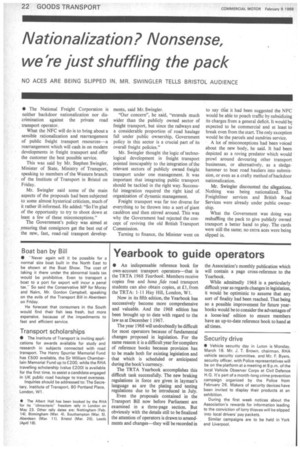Nationalization? Nonsense, we're just shuffling the pack
Page 24

If you've noticed an error in this article please click here to report it so we can fix it.
NO ACES ARE BEING SLIPPED IN, MR. SWINGLER TELLS BRISTOL AUDIENCE
• The National Freight Corporation is neither backdoor nationalization nor discrimination against the private road transport operator.
What the NFC will do is to bring about a sensible rationalization and rearrangement of public freight transport resources—a rearrangement which will cash in on modern developments in freight transport and offer the customer the best possible service.
This was said by Mr. Stephen Swingler, Minister of State, Ministry of Transport, speaking to members of the Western branch of the Institute of Transport in Bristol on Friday.
Mr. Swingler said some of the main aspects of the proposals had been subjected to some almost hysterical criticism, much of it rather ill-informed. He added: "So I'm glad of the opportunity to try to shoot down at least a few of these misconceptions."
The Government's policy was aimed at ensuring that consignors get the best out of the new, fast, road-rail transport develop ments, said Mr. Swingler.
"Our concern", he said, "extends much wider than the publicly owned sector of freight transport, but since the railways and a considerable proportion of road haulage fall under public ownership, Government policy in this sector is a crucial part of its overall freight policies."
Mr. Swingler thought the logic of technological development in freight transport pointed inescapably to the integration of the relevant sectors of publicly owned freight transport under one management. It was important that integrating public transport should be tackled in the right way. Successful integration required the right kind of. organization of dynamic management.
Freight transport was far too diverse for everything to be thrown into a sort of giant cauldron and then stirred around. This was why the Government had rejected the concept of reviving the old British Transport Commission.
Turning to finance, the Minister went on to say thiat it had been suggested the NFC would be able to poach traffic by subsidizing its charges from a general deficit. It would be expected to be commercial and at least to break even from the start. The only exception would be the parcels and sundries service, A lot of misconceptions had been voiced about the new body, he said. It had been depicted as a roving predator which would prowl around devouring other transport businesses, or alternatively, as a sledgehammer to beat road hauliers into submission, or even as a crafty method of backdoor nationalization.
Mr. Swingler discounted the allezations. Nothing was being nationalized. The Freightliner services and British Road Services were already under public ownership.
What the Government was doing was reshuffling the pack to give publicly owned transport a better hand to play. The cards were still the same; no extra aces were being slipped in.




































































































